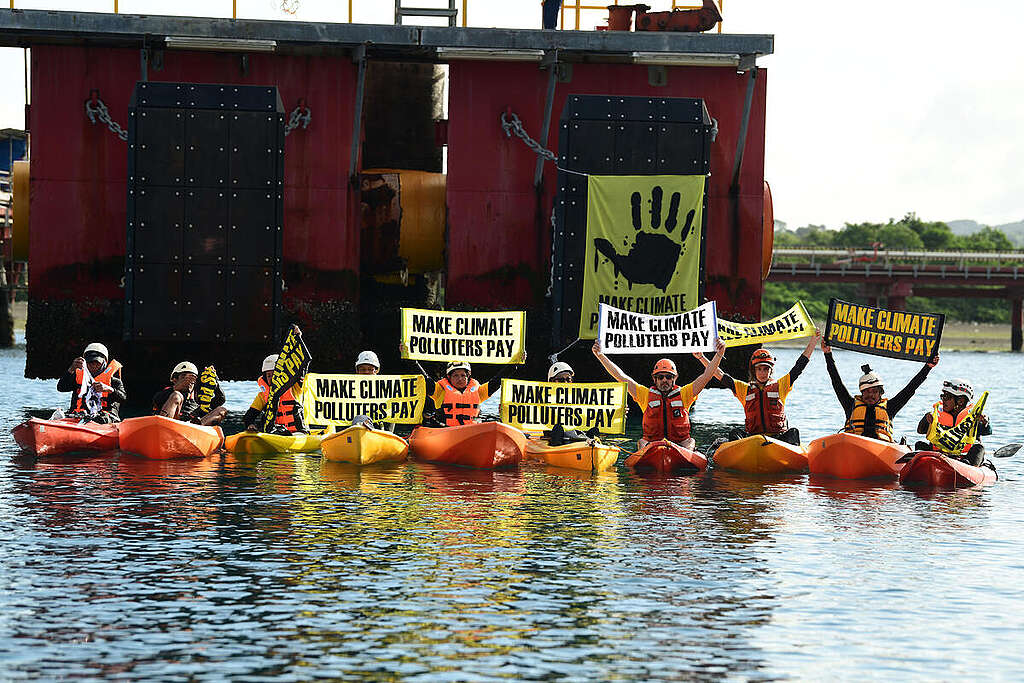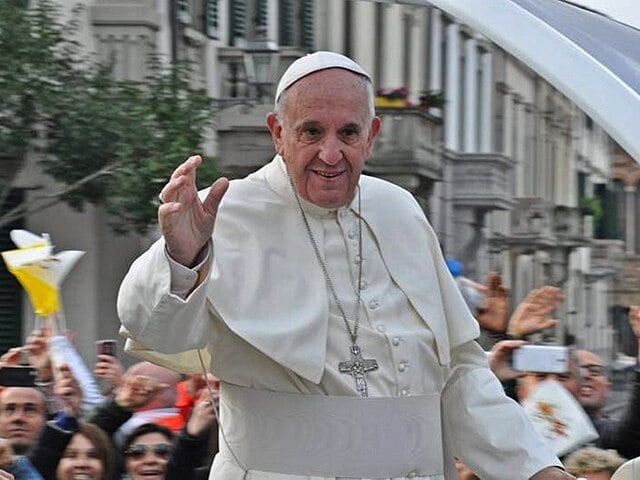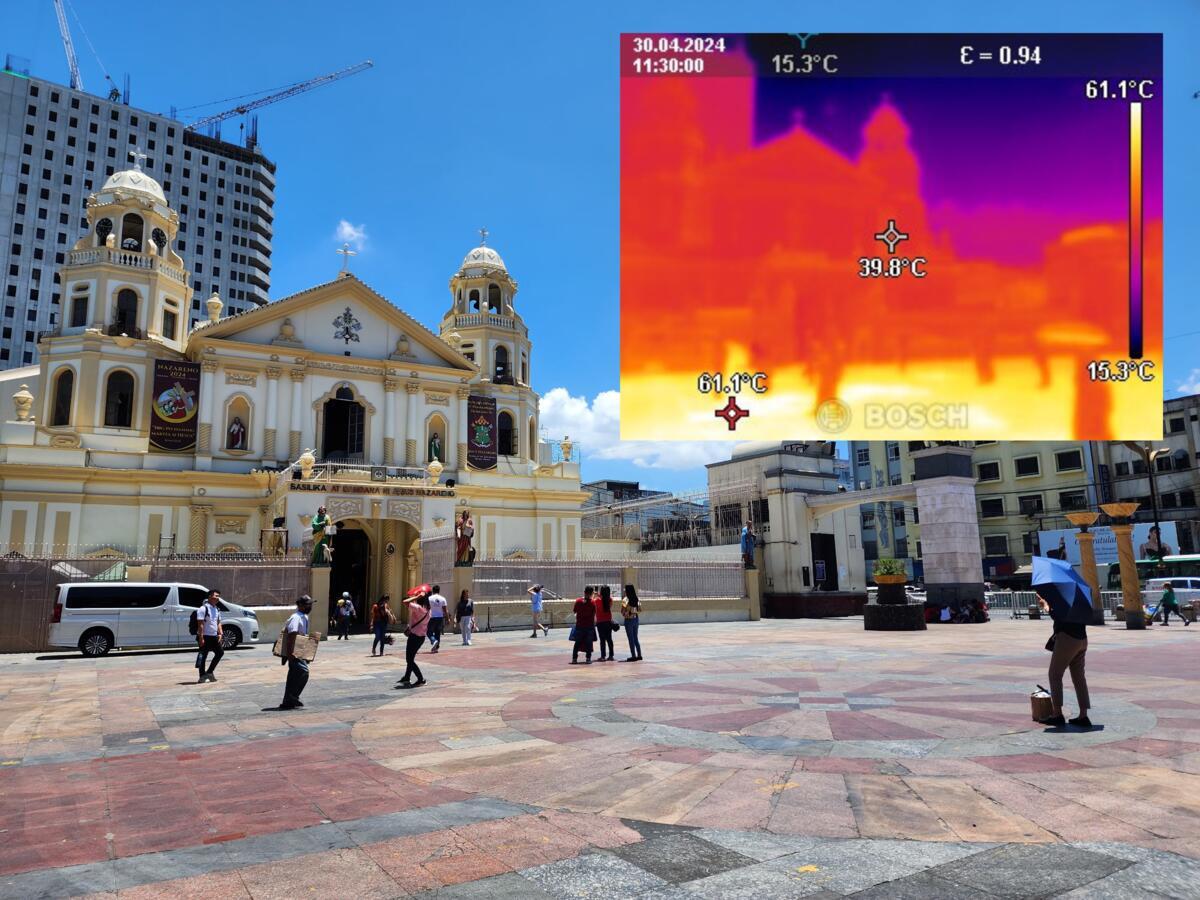
Loss and Damage Fund agreed at COP28, but fossil fuel accountability missing
BATANGAS CITY, Philippines (01 December 2023)—Today, Greenpeace activists blocking the Shell import facility in Batangas vowed more protests in the coming months as they expressed dismay over the lack of leadership from the Philippine government to demand reparations from corporate climate polluters. This came as a Loss and Damage fund was tabled for discussion on the first day of COP 28, but with fossil fuel companies’ accountability missing.
“For days, we were right at Shell’s doorstep, bringing the communities’ demands to the government in front of one of the biggest contributors to the climate crisis. Our blockade ends today: we have faced threats and intimidation, but we will continue ramping up the pressure—in halls of power, in courts, and in the streets,” said Greenpeace Philippines campaigner Jefferson Chua.
“Communities are demanding payment for losses and damages. But the government is clearly not listening. What a major disappointment,” he added. “But while the Philippine government is turning a blind eye to communities, people are taking leadership to demand payment from fossil fuel companies. As long as fossil fuel companies continue to deny their accountability, we will continue to challenge the Philippine President: Step up, take leadership and make polluters pay!”
Greenpeace believes the Philippine government must stand with communities—the country being one of the most vulnerable to climate risk in the past years[1]—and take the lead in pushing for climate reparations from the world’s biggest climate polluters.
Greenpeace reiterated its calls on the Philippine government, which is currently represented by DENR Sec. Antonia Yulo-Loyzaga at COP28—to make fossil fuel companies pay for losses and damages experienced by impacted communities. Greenpeace demands that climate-destroying businesses must: 1) acknowledge their disproportionate role in historical carbon emissions and commit to a just transition away from fossil fuels; 2) stop all fossil fuel expansion; and 3) pay up for the economic and non-economic loss and damages caused by climate impacts.
“This does not end here. This blockade—and the lack of response from the fossil fuel industry—only shows that there is an urgent need for our government to crack down on this destructive business, and make polluters pay for their role in this climate crisis,” Chua said.
###
Note to editors
[1] Philippine provinces among areas at most risk from climate damage | Philstar.com
Photos and videos of the blockade are in the Greenpeace media library here.
STATEMENTS FROM ALLIES
Ecowaste Coalition
Aileen Lucero, National Coordinator
“It’s time!
We need to hold companies, like Shell, accountable for their fossil fuel extraction which has an alarming impacts on the communities, the people, and the planet.
We cannot turn a blind eye to their problematic contributions directly affecting our whole ecosystem.
We deserve a better and cleaner environment. We demand climate justice.”
Break Free from Plastic
“The Break Free From Plastic Movement stands in solidarity with Filipino climate activists who are taking action to disrupt Shell’s operations, demanding that the company and other fossil fuel giants take accountability for their role in the escalating climate and plastic crises. The connection between fossil fuels and plastics, and both are disproportionately impacting vulnerable communities worldwide, from those living on the fenceline of petrochemical facilities to millions of others suffering from downstream issues like waste incineration. It is time for these polluters to pay for the damage they have caused and for governments to ensure we have an ambitious global plastics treaty with commitments to reducing plastics production.”
Alay sa Kinabukasan, Lakas At Talino (AKLAT) Foundation
Marlon Feliciano, Chairman
“Together let us underscore the unfairness and injustice brought by climate polluters. Ensure adequate access to healthy food, active and sustainable transportation, clean air and water and safe homes. Climate Justice now!”
Rep. Anna Veloso-Tuazon
Leyte 3rd District
“With COP 28 off to an auspicious start with member countries adopting the decision to make operational a Loss and Damage fund to compensate countries already dealing with the adverse impacts of climate change, and with the Philippines’ House of Representatives doing its part to locally operationalize climate accountability through the creation of a loss and damage focused framework under the CLIMA bill that we have just filed, we are, as UN Secretary General Antonio Guterres puts it, trying to massively fast-tract climate efforts in every country, every sector, and on every time frame, because demanding that others move first only ensures that humanity comes last.
Attribution science confirms that fossil fuel dependence increases the risk of slow-onset events associated with the adverse impacts of climate change, so we need to treat conduct contributing to climate change as a harm in and of itself. Changes on a global scale begin with local buy-in, and we– States, institutions, entities, corporations, and individuals – all have to help move the needle by shifting consumer behavior and disincentivizing business-as-usual conduct that detracts from our climate ambition to limit global warming and make the Paris Agreement work for our people and our planet.”
Living Laudato Si’ Philippines
John Leo Algo, Deputy Executive Director for Programs and Campaigns
“Countries like the Philippines experience loss and damage only because big polluters are still allowed to continue their “business-as-usual” operations, and even influence the climate negotiations. Climate justice can never be achieved unless these polluters pay and are held accountable for causing the suffering of communities and the destruction of ecosystems.”
Rep. Edgar M. Chatto
Bohol 1st District
“The way to address adverse effects of climate change is not the responsibility of State or government alone. All stakeholders who calls earth their home is responsible for this and the generations to come. The issue of climate change should, at the very least, call us to look into our processes to ensure that we are not doing harm. Private corporations may do well in leading green and sustainable practices towards the shared goal of ensuring that the environment is given the care it deserves for the continued existence of humanity. In the interim, companies whose practices does not comply with global standards in terms of carbon emissions must be held accountable and face the full extent of the law.”
Media Contact:
Karl Orit, Greenpeace Communications Campaigner
[email protected] | +63 9194571064
Maverick Flores, Greenpeace Communications Campaigner
[email protected] | +63 9176211552



